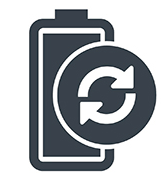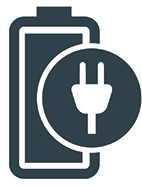Off-Grid Power – Air Conditioners Solar power and lithium battery technology have revolutionized the way...
Read MoreBOOSTING RV BATTERY HEALTH
Optimizing Your RV Battery Investment
Most savvy RVers use checklists to prepare for their road trips and camping adventures. There’s even an app for it! However, too often, campers and boondockers don’t check the condition of their RV batteries before heading out. And battery failure can lead to major headaches when you’re parked literally in the middle of nowhere.
The Perils of Overcharging Your RV Batteries
One of the leading causes of battery failure is overcharging. Overcharging your RV batteries can result in severe water loss, plate corrosion, and eventual failure. Most RVs have a converter with a built-in battery charger. Many RV owners assume that chargers will keep the batteries topped off if you keep the RV plugged in while it’s in storage. While it’s true that maintaining a float charge on your batteries is extremely important, the problem lies elsewhere. Many older and less expensive RV converter chargers provide a constant charge in the range of 13.5 volts. This charge rate is simply too high for fully charged batteries — as a result, the electrolyte can boil off over time, resulting in premature battery death.

Updated Technology Provides a Solution
Luckily, converter charger technology has evolved. Most newer RV converter chargers are classified as ‘3-stage chargers.’ The first stage provides a bulk charge to replenish the battery to approximately 90% of its capacity. Next, the second-stage absorption charge is designed to help prevent battery gassing and water loss by replenishing the remaining 10%. Finally, stage three is referred to as a ‘float’ or maintenance charge that keeps the battery at 100%. The float charge, at roughly 13.2 volts, prevents the battery from overcharging.
Undercharging Can Also Lead to Battery Failure
The second leading cause of battery failure is under-charging. If batteries are discharged and not recharged promptly, sulfate material starts to build up within the battery. This material attaches itself to the discharged portions of the battery plates and begins to harden into crystals. If batteries aren’t recharged soon enough, the sulfate can’t be converted back into active plate material, and the batteries may be damaged or ruined.

Good Recharging Habits Are Essential
A simple way to reduce the impact of undercharging is to recharge your batteries often. For example, if you discharge your battery to 50% (then recharge), it will last up to twice as long compared to discharging it to 20%. While other factors like overcharging and high temperatures can also impact battery life, a regular charging discipline will help preserve your battery investment.
Extend Your Battery Life with Solar Power
Adding a solar panel and a charge controller to your RV can help mitigate overcharging and undercharging issues. Solar power delivers a slow charge to your batteries — perfect for optimal performance and battery health. Conducting routine maintenance and using a solar solution to frequently recharge your batteries can dramatically extend RV battery life — in many cases, from 1-2 years to 5-7 years.

Size Solar for your RV
Are you ready to find out how much solar you need for your RV or travel trailer? Click here to visit our online calculator to size your system!
LATEST NEWS
Watch product troubleshooting videos, read the latest in company updates, and stay up-to-date on trade-shows and events.
Creating the Ultimate Solar-Powered Car
Few people have a more diversified portfolio when it comes to custom car builds than...
Read MoreGo Power! Wins Gold in
Go Power! Wins Gold for Favorite RV Solar Product in the 2024 Wildsam Reader’s Choice...
Read More
STAY UP TO DATE
Get news, product specials, and event invites directly to your inbox.







